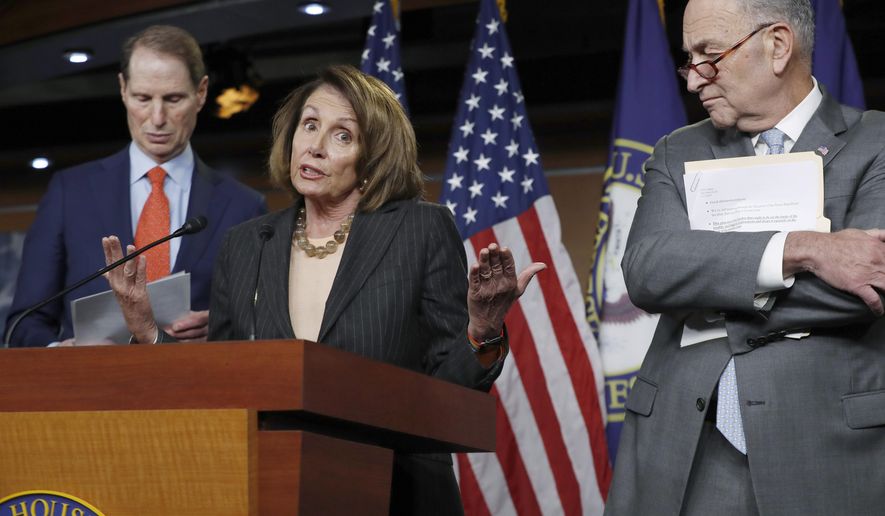When it comes to voter ID laws, Republicans care intensely about fraud while Democrats worry more about whether their own party will come out ahead, according to a provocative new academic study that challenges conventional assumptions about what motivates support for stricter voting laws.
Voting-rights activists have long accused GOP officeholders of racism or political expedience in fights over voting laws, but the study suggests that at least for average voters, Republicans’ support is a good-faith assessment of dangers they see in illegal voting.
Republicans respond to even small reports of voter fraud, seeing them as a reason to back stricter voting access, according to the research by John V. Kane, a professor at New York University, whose study was published in the latest Public Opinion Quarterly.
Democrats, meanwhile, generally support voter-ID but their support is less firm. If told the GOP would suffer from stricter voter-ID laws, Democrats become more supportive, Mr. Kane found.
“There’s different concerns in both camps. Republicans really do appear to be super-concerned about fraud and Democrats not so much. Democrats really appear to be concerned about the electoral implications, not so much fraud,” Mr. Kane told The Washington Times.
His findings were for voters at large, where overall support for voter ID is relatively high among Democrats, Republicans and independents.
By contrast, GOP and Democratic lawmakers are deeply divided, with the latter accusing the GOP of trying to deny minorities, the elderly and poor voters an equal chance at the polls.
Mr. Kane’s study, tested through a series of polling questions, asked voters about their support for voter ID, then experimented with what happened when told about voter fraud, and about effects of ID laws on their own party’s electoral success.
GOP voters’ already high support for photo ID at the polls increased when told about even small instances of fraud. But it showed little change when told that Democrats would benefit, or when told the GOP would benefit.
Independents also responded to reports of voter fraud by increasing support for photo ID — though not to the levels of Republicans.
Among Democrats, though, moderate support for voter ID didn’t budge when told about fraud. Support for voter ID did surge when told Democrats would benefit, and plunged when told Republicans would benefit.
Attempts to reach voting-rights groups for reaction were unsuccessful, but one professor who studies voting rights said his reading of Mr. Kane’s findings was that Republican voters were so strongly in favor of ID laws that nothing could move them — not even partisan considerations.
Mr. Kane countered that there was indeed some room for movement, as proved by the rise in support based on accounts of voter fraud. “I don’t know that I’d say they’re completely non-malleable,” he said.
The actual prevalence of voter fraud is heatedly debated, with voting-rights activists arguing it’s overstated and the actual evidence is scant.
In his questions, Mr. Kane suggested that fraud is a slim problem, saying that over the last 15 years there have been 31 incidents — out of 1 billion ballots cast — of a voter trying to impersonate someone else at the polls.
President Trump, though, has claimed fraud — including non-citizens voting — is rampant, and has created a voter integrity commission to study the issue.
Two of the panel members said Mr. Kane’s study undersold the threats of fraud, though they said his conclusion that worries about fraud motivates voters are accurate.
J. Christian Adams, president of the Public Interest Legal Foundation and a commission member, called Mr. Kane’s study “academic gobbledygook.”
“Voter ID is yesterday’s fight, and it’s a fight proponents won because it is supported overwhelmingly,” Mr. Adams said. “The bottom line is the vast majority of Americans support voter ID. That some academic study found that Democrats are less concerned about election crimes is hardly news.”
Hans Von Spakovsky, another commissioner and senior fellow at the Heritage Foundation, said some of Mr. Kane’s framing in his questions to voters were wrong in that they too narrowly described the dangers and prevalence of fraud.
But he said the basic conclusion that GOP voters are motivated by a law-and-order approach to voting is correct.
“I do agree that Republicans want ID because of their concerns over fraud and not because they somehow believe it will help them strategically and in a partisan fashion,” he said.
• Stephen Dinan can be reached at sdinan@washingtontimes.com.




Please read our comment policy before commenting.